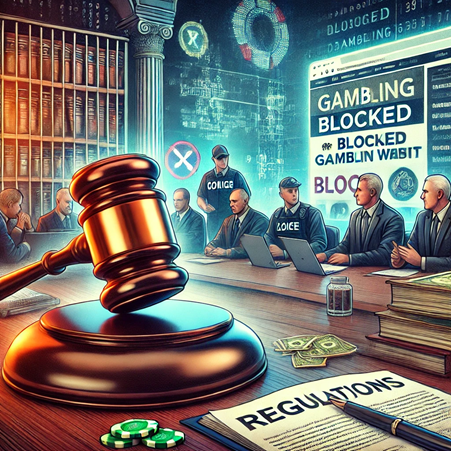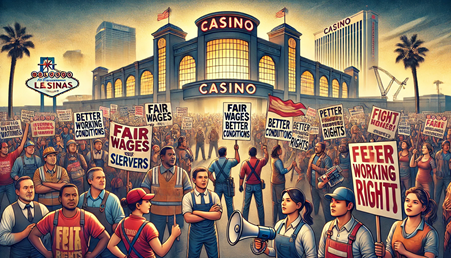Cases of underage gambling in casinos and online platforms

Cases of underage gambling in casinos and online platforms
by Nathaniel 05:19pm Jan 16, 2025

Cases of underage gambling in casinos and online platforms
Underage gambling is a significant concern in both physical casinos and online gambling platforms, as it poses ethical, legal, and social challenges. It is illegal for individuals under the legal gambling age (typically 18 or 21, depending on the jurisdiction) to participate in gambling activities, and yet there are numerous cases of underage individuals gaining access to gambling environments, either through physical venues or online platforms. These instances can have serious consequences for the minors involved, including addiction, financial hardship, and even legal repercussions for the operators involved.
1. Underage Gambling in Physical Casinos
Challenges:In physical casinos, the risk of underage gambling is mitigated by strict age verification procedures. Casinos often require patrons to show identification (ID) before being allowed to enter gaming areas or participate in gambling activities. However, underage individuals can sometimes find ways to bypass these security measures, such as by using fake IDs, being accompanied by an adult, or through lack of rigorous enforcement in certain venues.
Cases and Incidents:
Case Example 1: In 2019, a 17-year-old in Las Vegas was caught illegally gambling in one of the city’s major casinos. Despite the casino's policies of checking ID, the minor had been allowed to enter by using a fake identification. The casino was fined, and the minor was banned from returning to the property.
Case Example 2:In the UK, a study found that approximately 55,000 16- and 17-year-olds were able to access gambling services despite being underage. Many young people reported using fake IDs, and others gained access to gambling activities through online gaming sites that didn’t effectively enforce age checks.
Impact:Underage gambling in physical casinos can lead to significant legal and financial consequences, not just for the minors involved but also for the casinos themselves. Casinos can face heavy fines and reputational damage for allowing underage gambling. Additionally, minors who gain access to gambling environments may be exposed to addictive behaviors at an early age, which can lead to gambling problems later in life.
Measures to Prevent Underage Gambling:
Strict ID Checks:Casinos must ensure all patrons are subject to strict identification checks at entry points, ensuring that only those of legal age can enter the gaming areas.
Staff Training: Employees should be trained to recognize fake IDs and know the legal age requirements for gambling in their jurisdiction.
Surveillance and Monitoring: Casinos can use surveillance systems to monitor patrons and ensure that no underage individuals are participating in gambling activities.
2. Underage Gambling in Online Platforms
Challenges:Online gambling platforms present a more complicated challenge for preventing underage gambling. Unlike physical casinos, which can check IDs in person, online platforms rely on self-reported age during registration. Despite age verification processes being in place, minors often find ways to bypass these measures, such as using fake details, accessing gambling sites through adult accounts, or using online gambling apps that don’t effectively enforce age restrictions.
Cases and Incidents:
Case Example 1:In 2020, a report from the UK Gambling Commission revealed that thousands of underage individuals were able to access online gambling sites. These minors often used false age declarations when creating accounts or exploited gaps in the age verification processes.
Case Example 2:A case in Canada highlighted that a 16-year-old was able to participate in online sports betting through a legitimate online platform by falsely registering as an adult. When the minor was caught, the platform faced public criticism for its inadequate verification methods.
Case Example 3: In Australia, several online gambling operators were fined for failing to prevent underage users from accessing their platforms. These platforms were found to have insufficient identity verification mechanisms,allowing minors to gamble online.
Impact:Online gambling platforms that fail to prevent underage gambling face reputational damage, legal action, and potential loss of licenses. Moreover, underage gambling online can expose minors to risks of addiction, financial losses, and exposure to inappropriate content or unsafe interactions with other gamblers.
Measures to Prevent Underage Gambling:
Enhanced Age Verification: Online platforms must implement more robust age verification systems, including document checks, facial recognition, or third-party verification services to confirm that users are of legal age.
Parental Controls: Some online gambling platforms offer tools for parents to block or monitor gambling activities on devices used by minors. Platforms should also consider offering gambling exclusions based on account holders’ parental controls.
AI and Machine Learning: Platforms can use AI-powered tools to monitor gambling behavior for signs of underage or risky gambling. This can help detect anomalies that suggest a minor may be attempting to gamble on the site.
3. The Role of Social Media and Mobile Apps in Facilitating Underage Gambling
Challenges:Social media platforms and mobile gaming apps increasingly serve as entry points for underage gambling. These platforms may offer gambling-like experiences or real-money gambling opportunities, where age verification is not always enforced strictly. For example, games that allow players to buy virtual currency or "loot boxes" may serve as a gateway for underage gambling behaviors.
Cases and Incidents:
Case Example 1:In 2018, an investigation into mobile gaming apps revealed that many games targeted at children had in-app purchases that resembled gambling. Underage players, often unaware of the consequences, spent real money on these in-game purchases, leading to financial losses and addictive behavior. Some of these games allowed minors to bypass age restrictions or have their accounts linked to adult credit cards without additional verification.
Case Example 2:On social media platforms, advertisements for gambling apps and online casinos have been found to be targeted at younger audiences through influencer marketing, which could expose underage users to gambling-related content and encourage participation.
Impact:As mobile apps and social media platforms become more integrated with gambling activities, they pose an increased risk of underage gambling. This could normalize gambling behaviors among minors and blur the lines between gaming and real-money gambling.
Measures to Prevent Underage Gambling:
Stronger Age Verification: Social media platforms and gaming apps must implement stronger age verification procedures before allowing access to gambling-related content or in-game purchases.
Regulation of Advertising: Governments should regulate advertising practices on social media platforms to prevent targeting minors with gambling-related ads or endorsements by influencers.
Education and Awareness: Platforms should educate young users about the risks of gambling and encourage responsible gaming behaviors, especially in apps that may offer real-money elements.
4. Legal and Regulatory Actions
Government Response:Governments worldwide have taken various steps to address underage gambling, particularly with the growth of online gambling. This includes enforcing stricter regulations on age verification, setting up self-exclusion programs, and penalizing operators that fail to comply with age restrictions.
Cases and Incidents:
Case Example 1: In the UK, the Gambling Commission has fined several online gambling companies for failing to prevent underage gambling. The fines were part of a broader initiative to ensure that gambling operators comply with age verification standards.
Case Example 2:In the United States, several states, including New Jersey and Pennsylvania, have introduced stricter regulations for online gambling platforms, requiring operators to verify the ages of users more rigorously and penalizing those that fail to do so.






